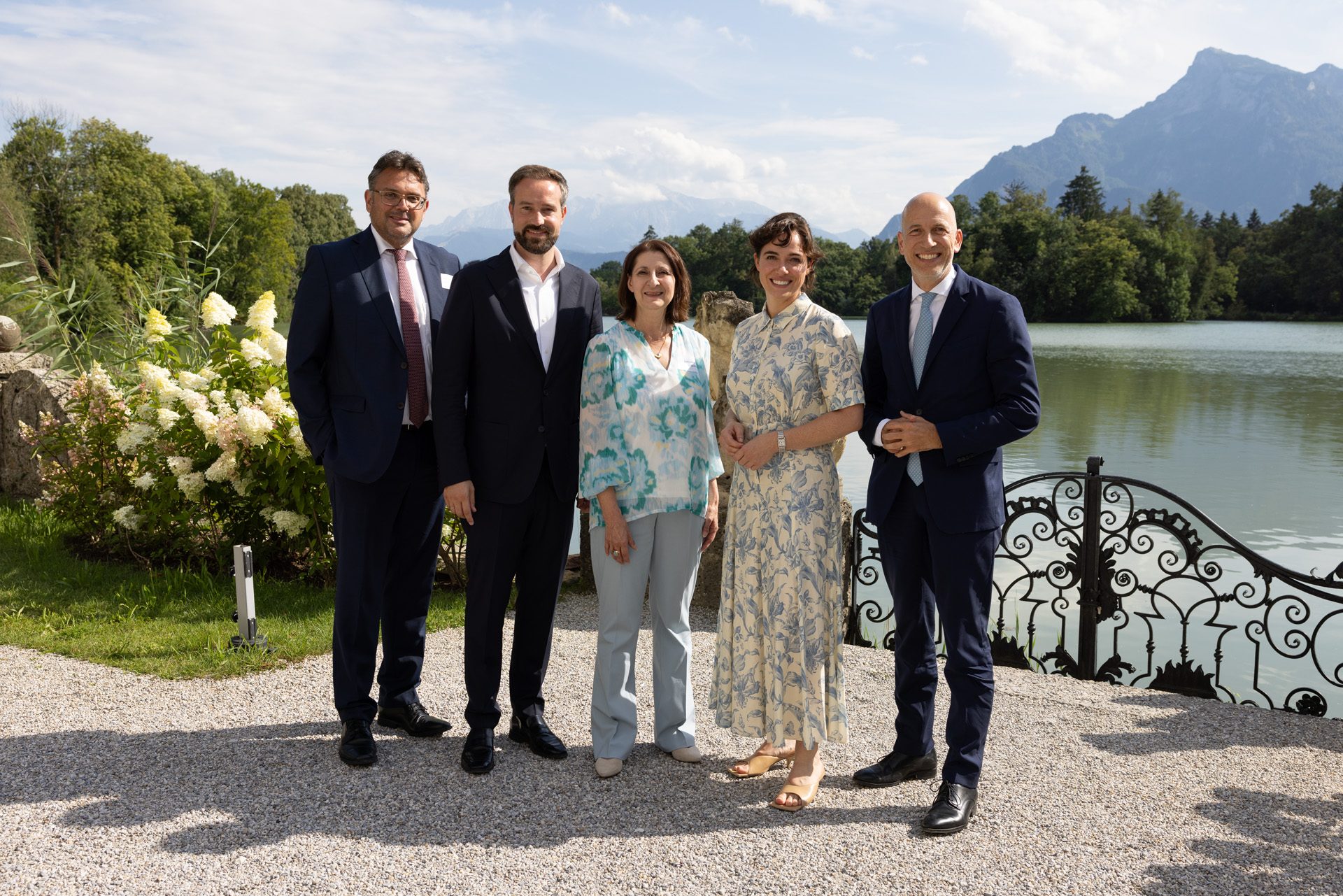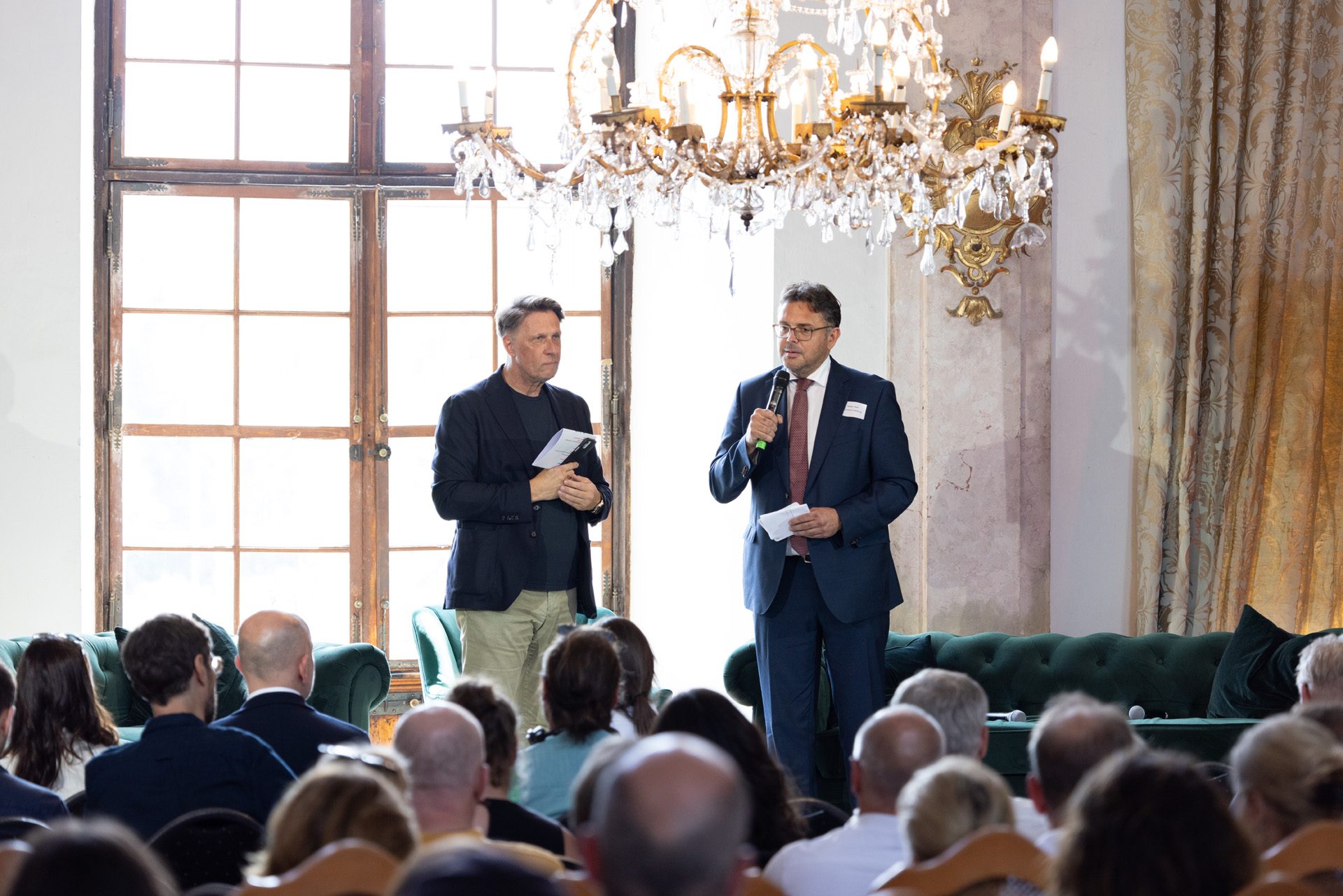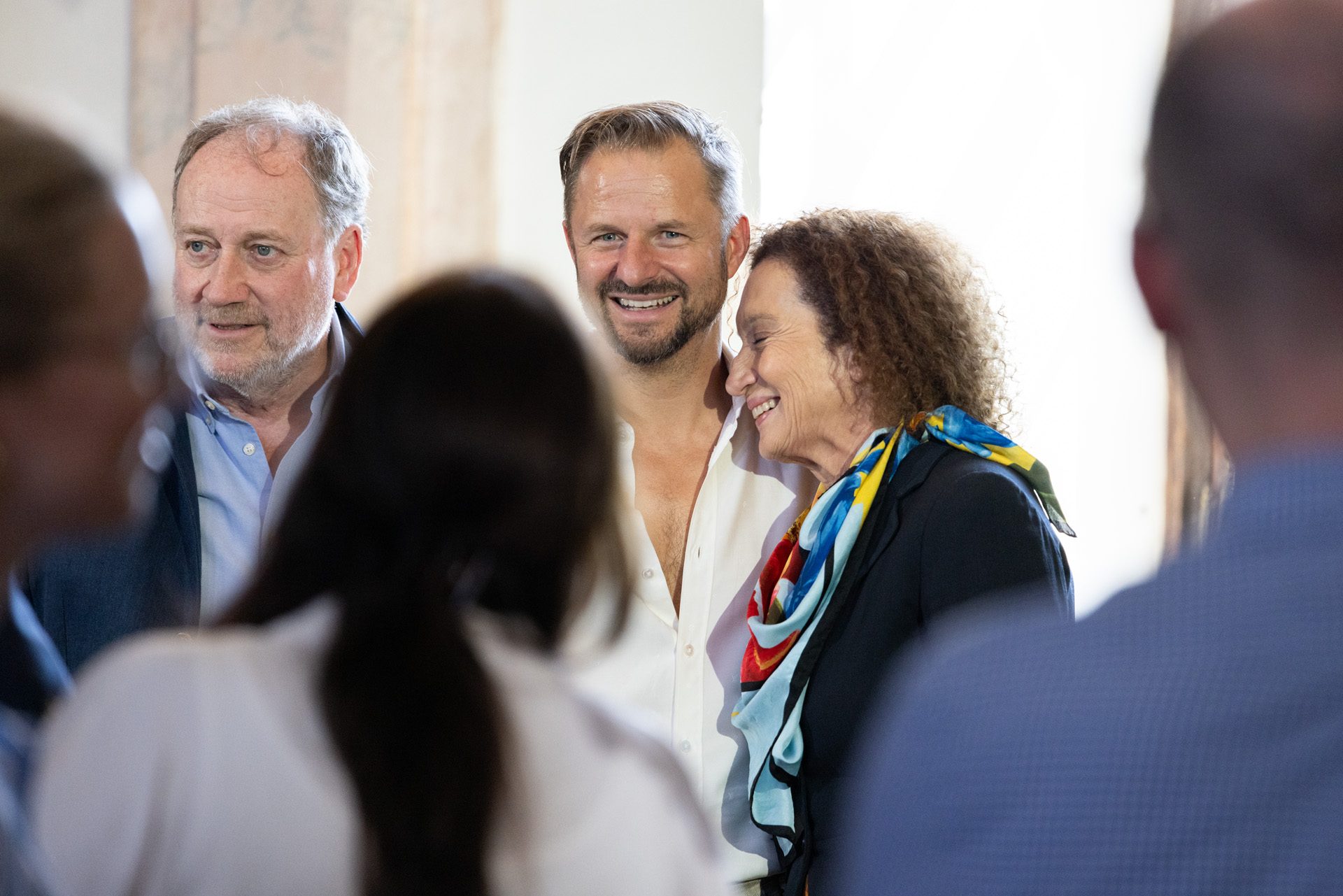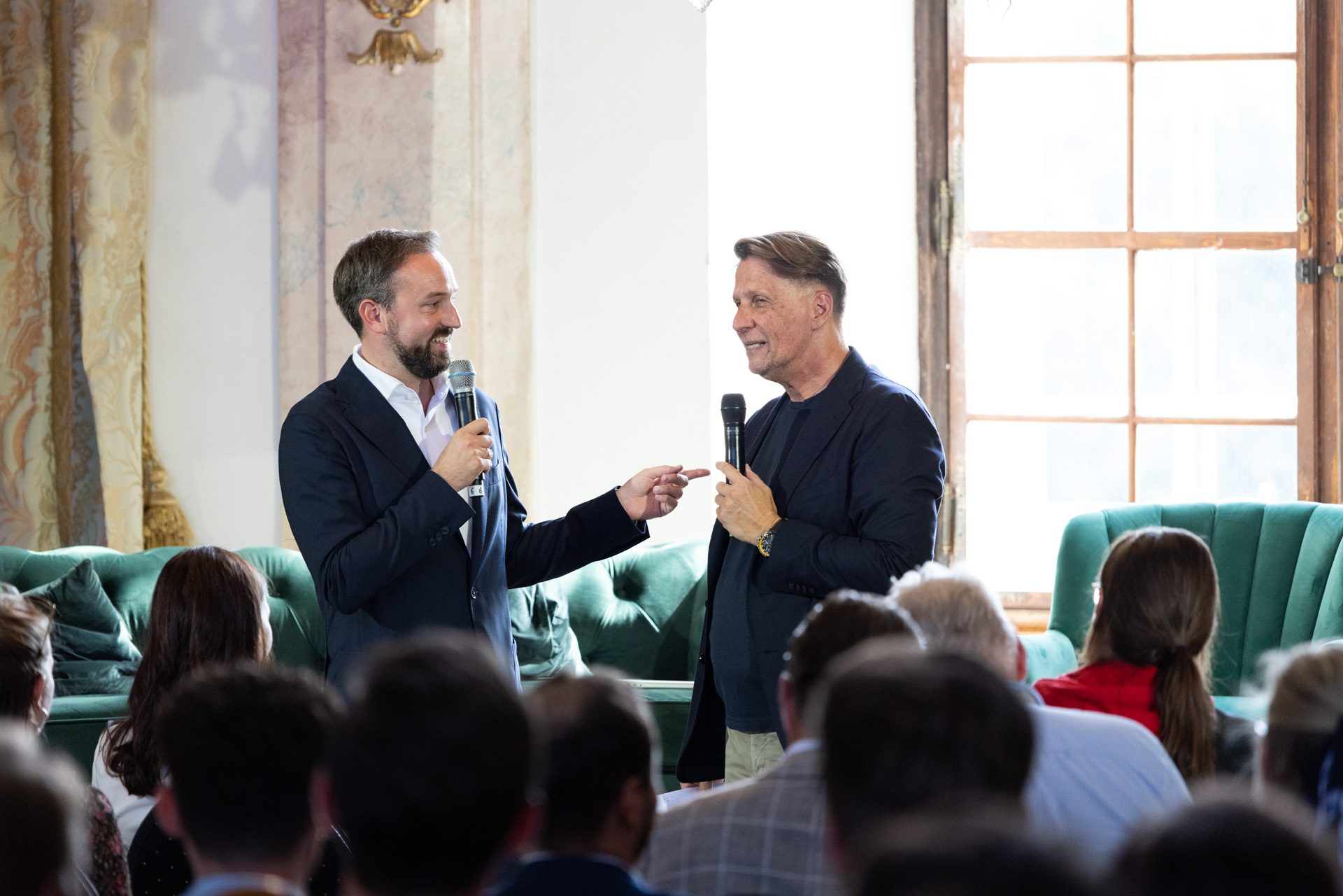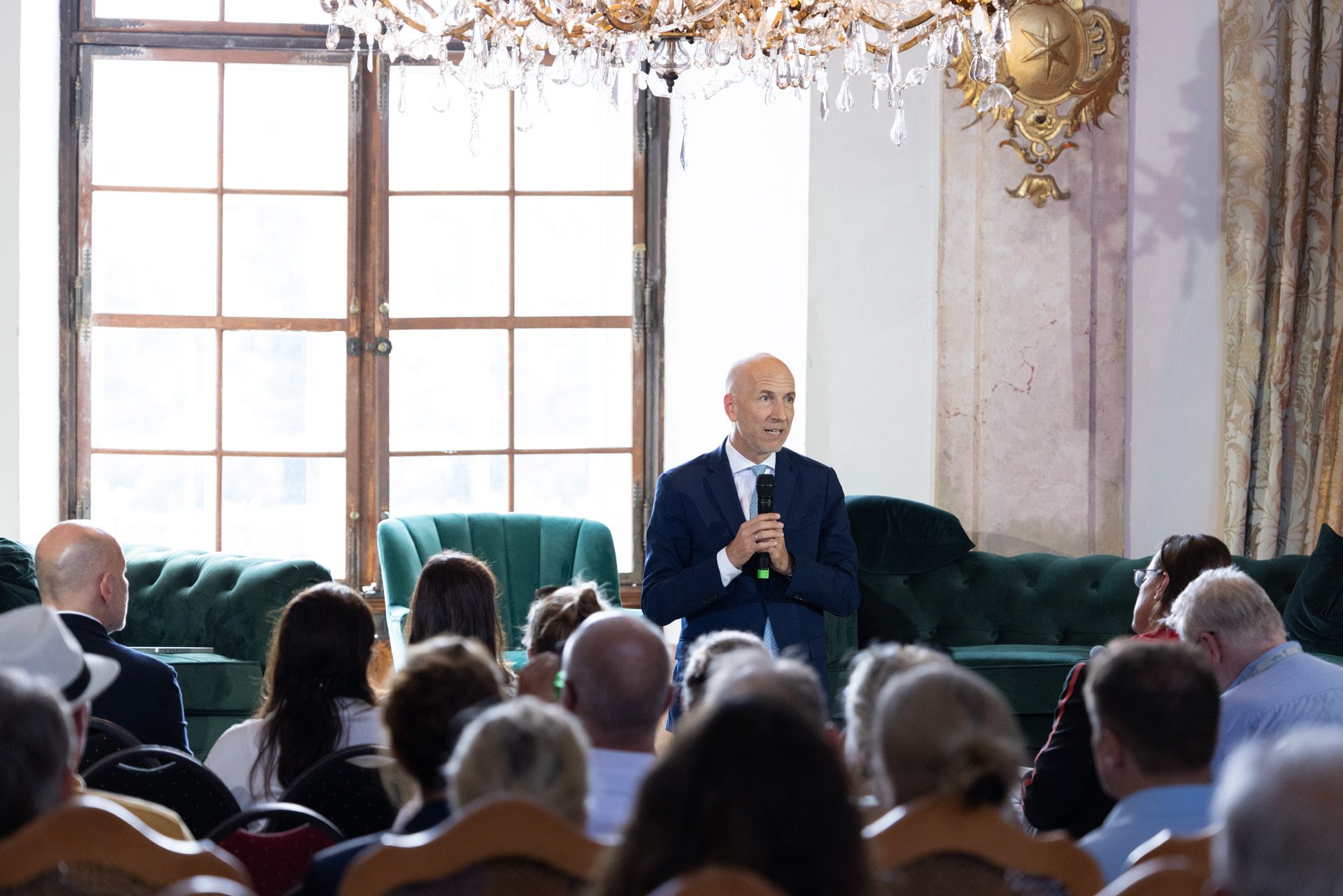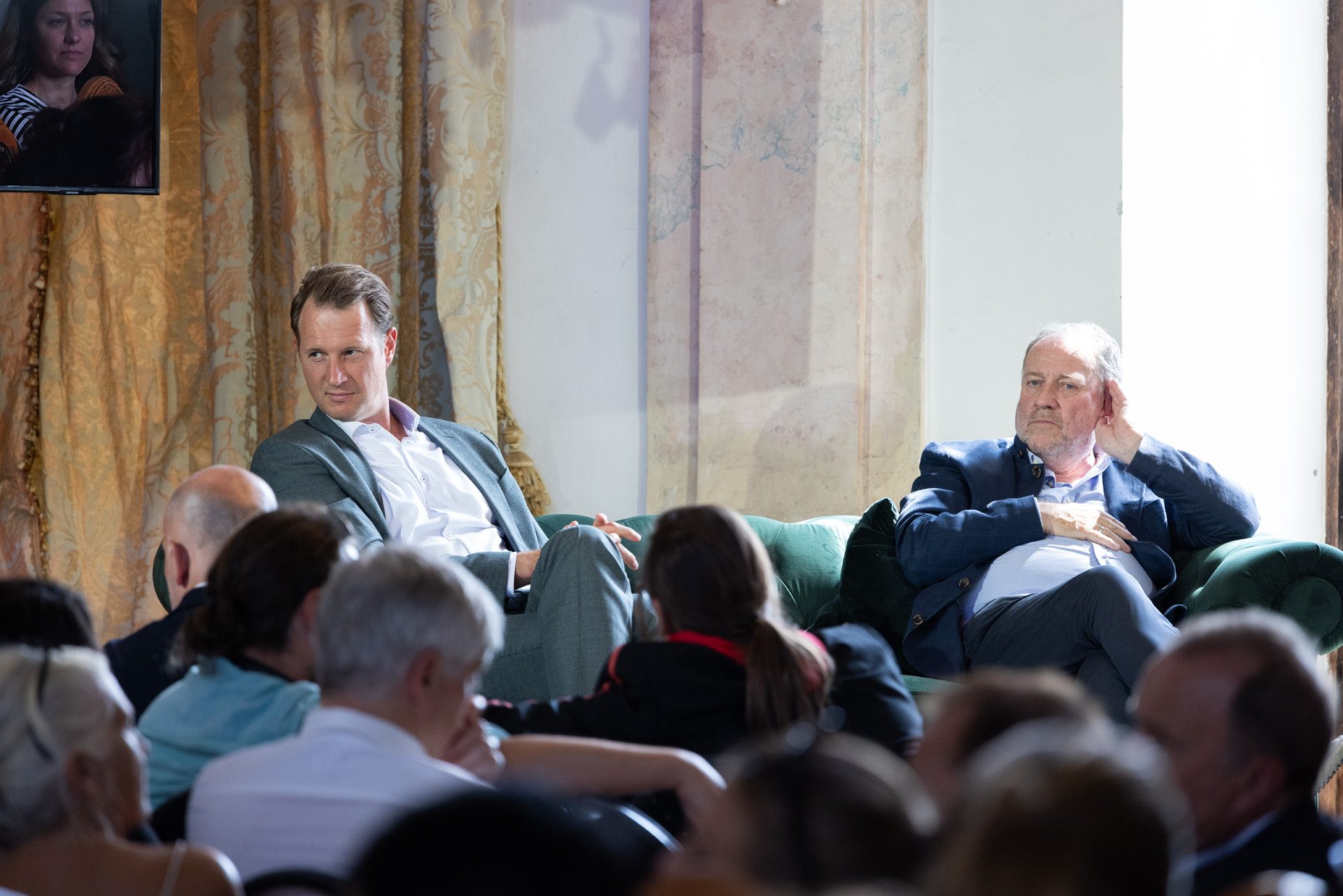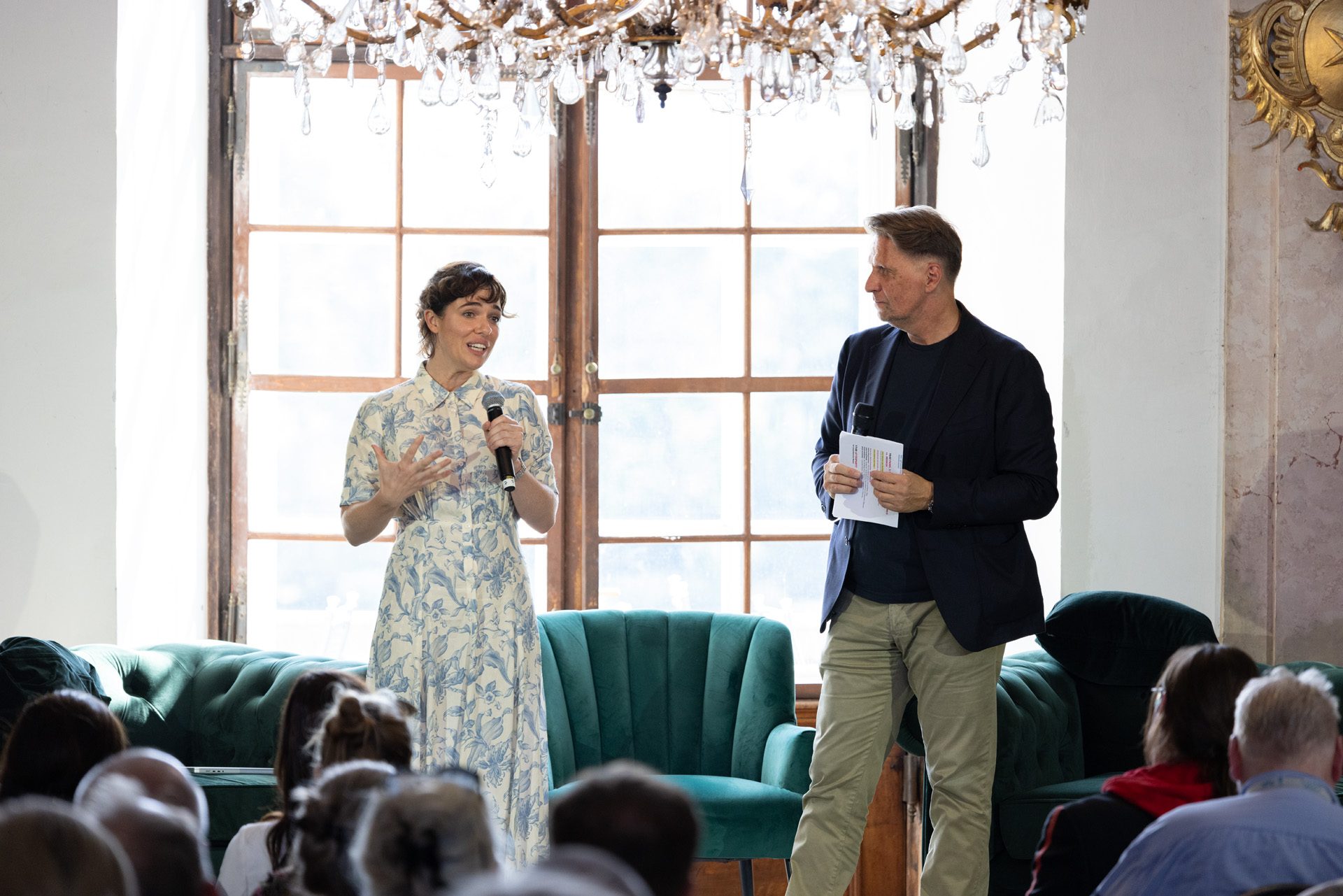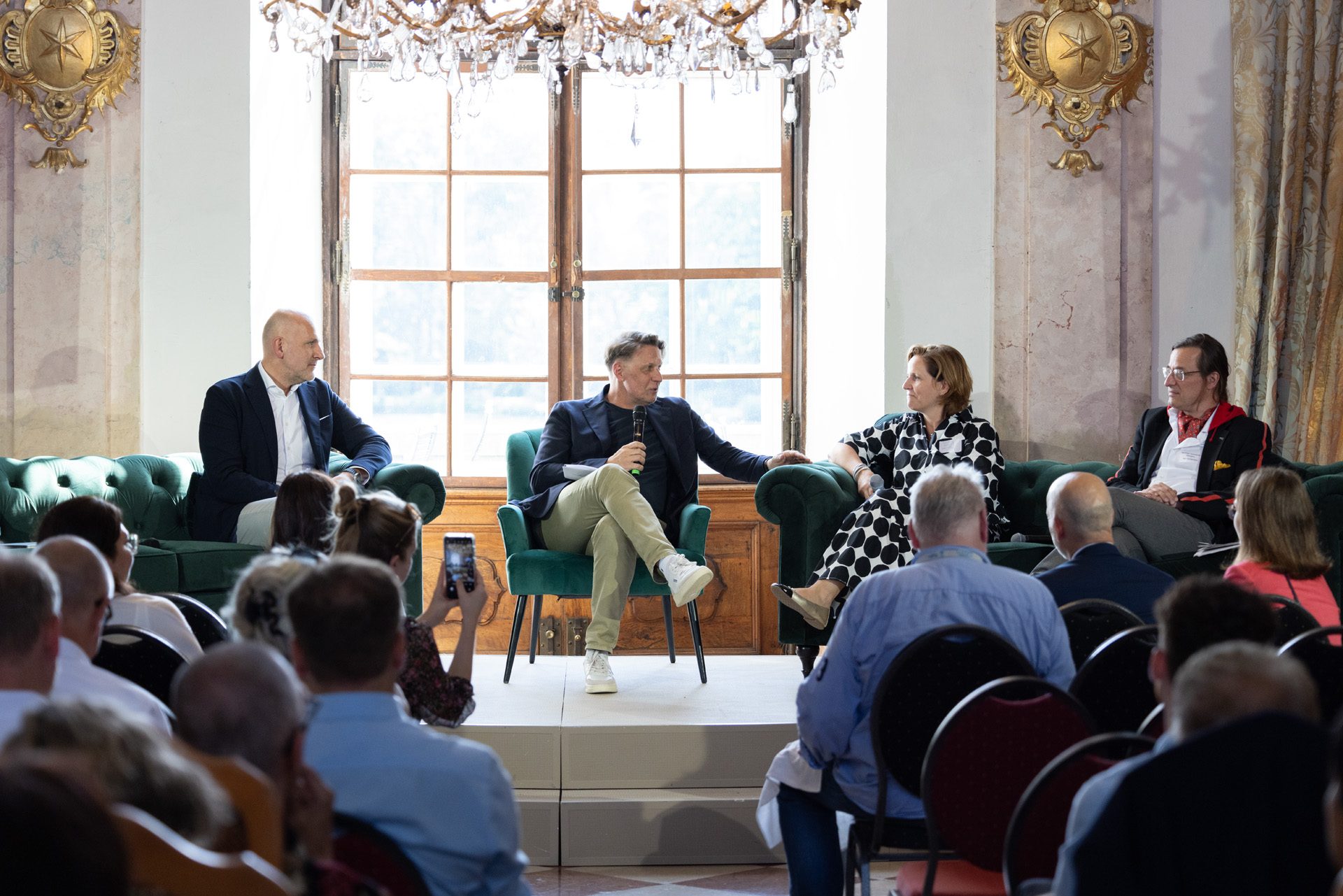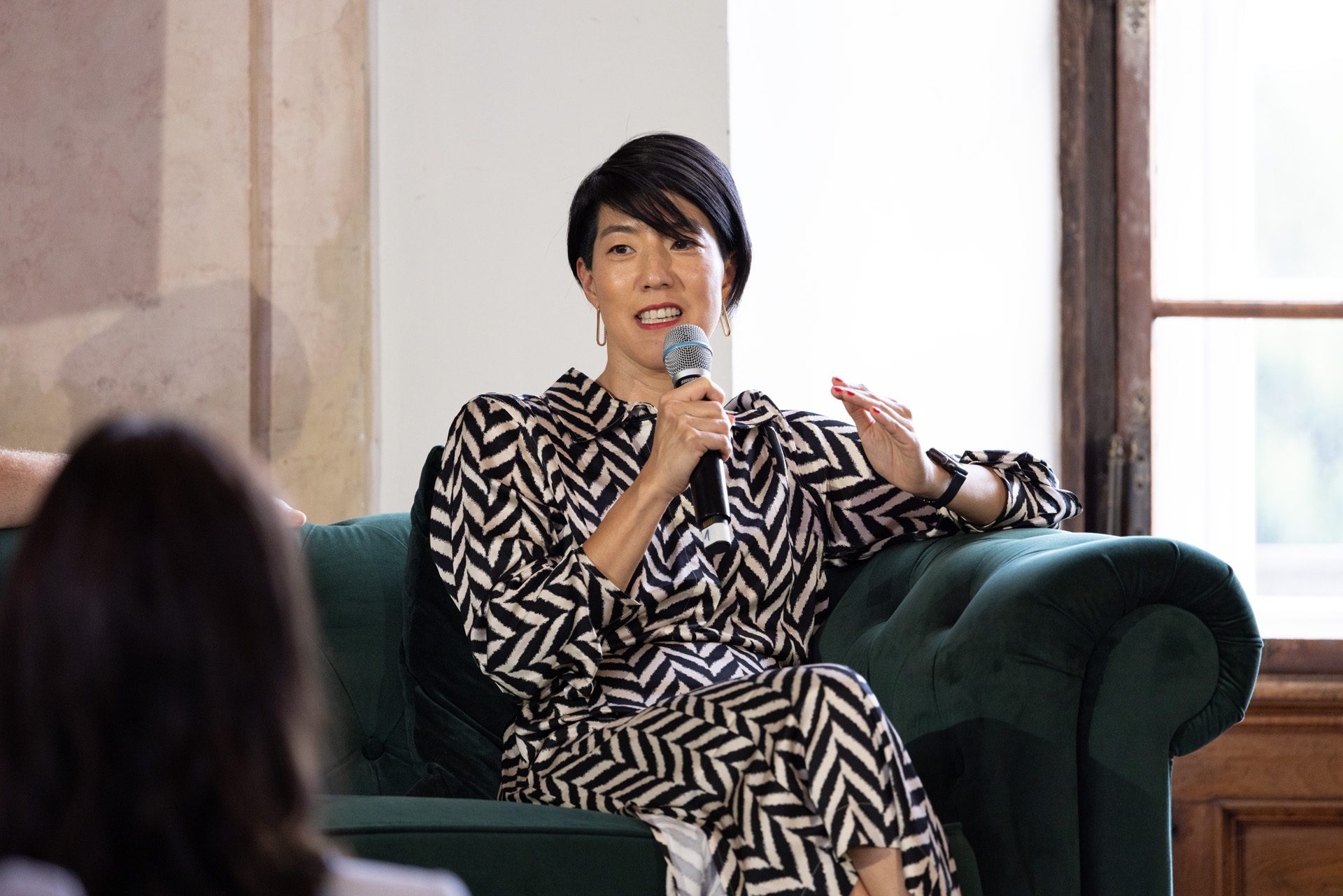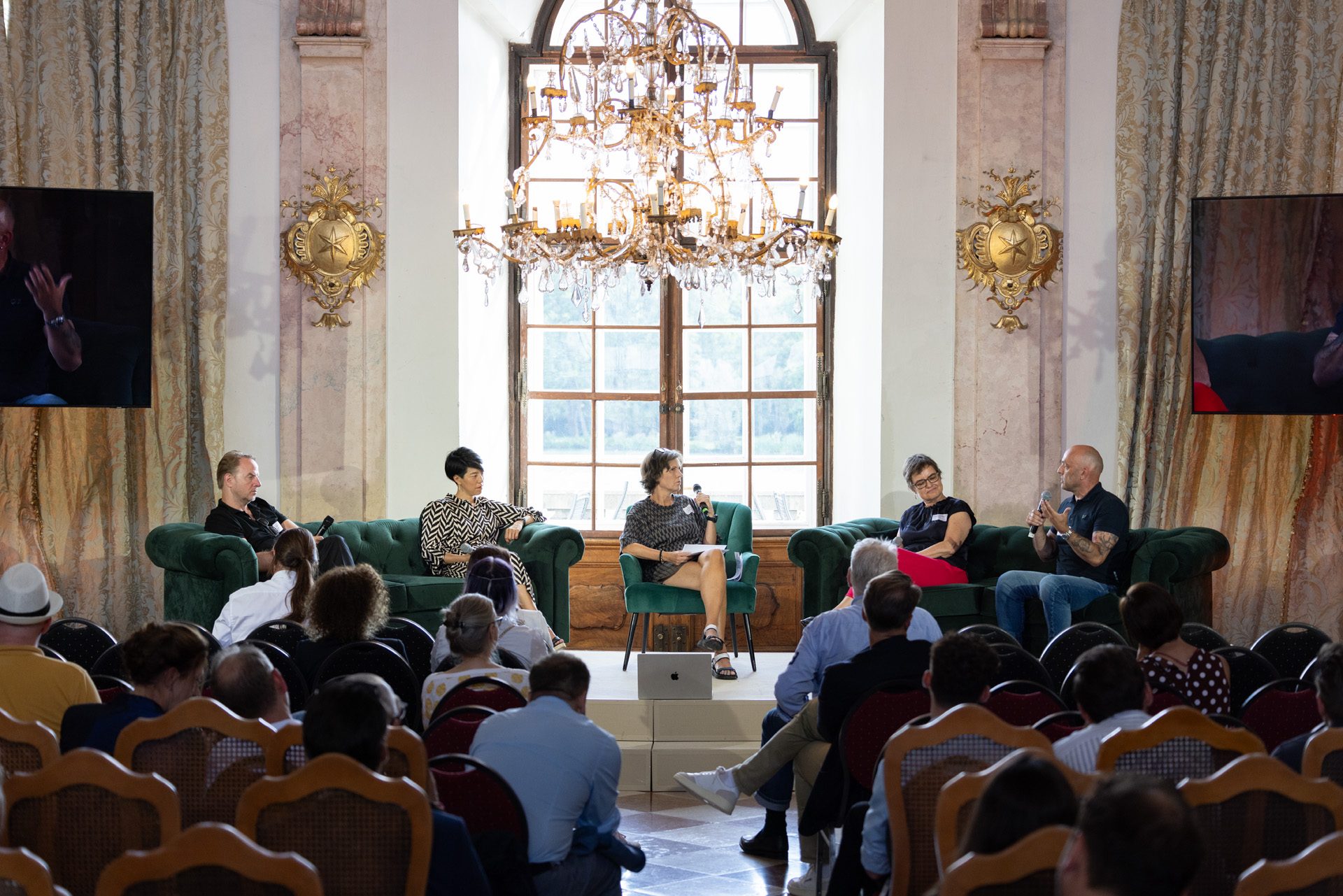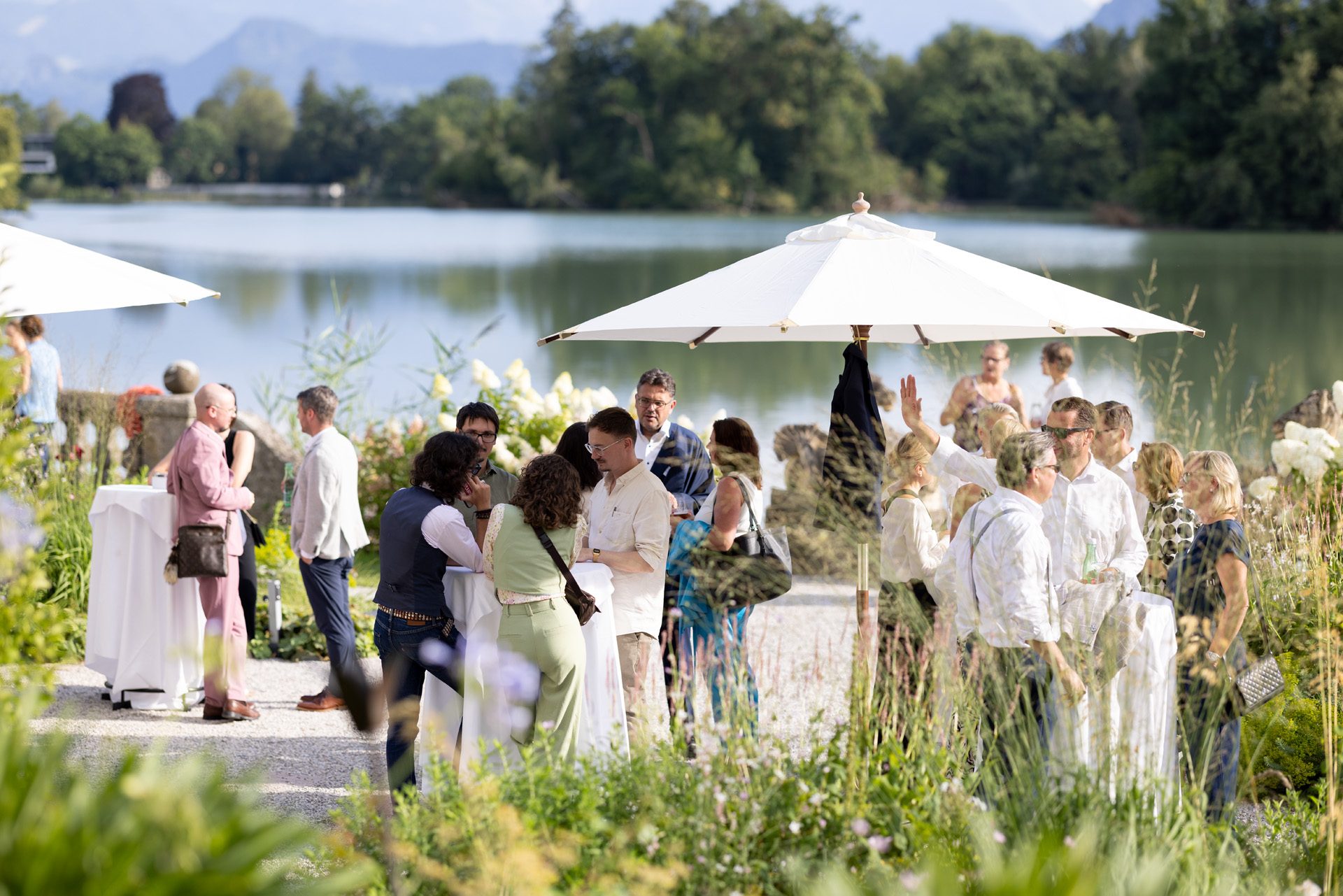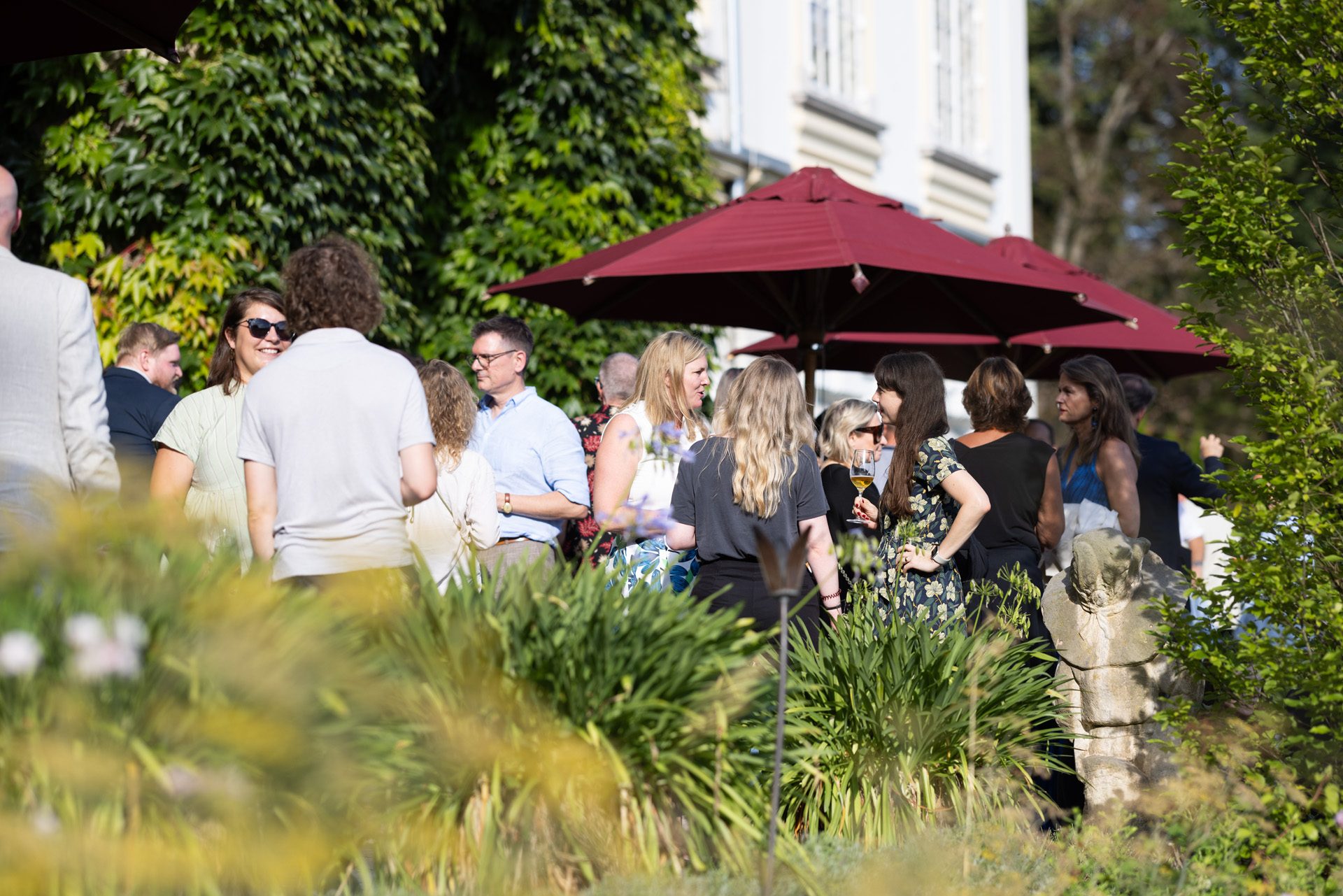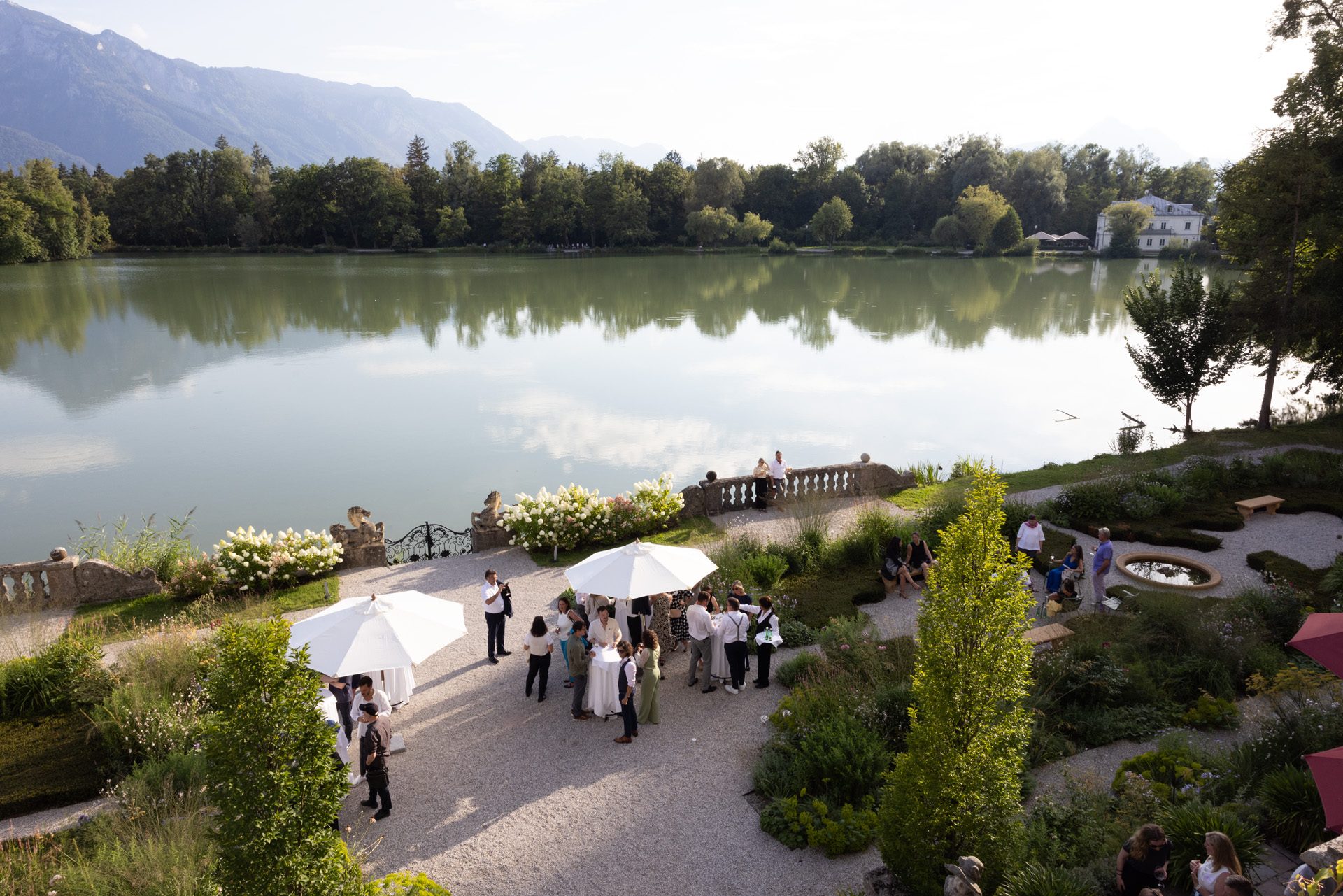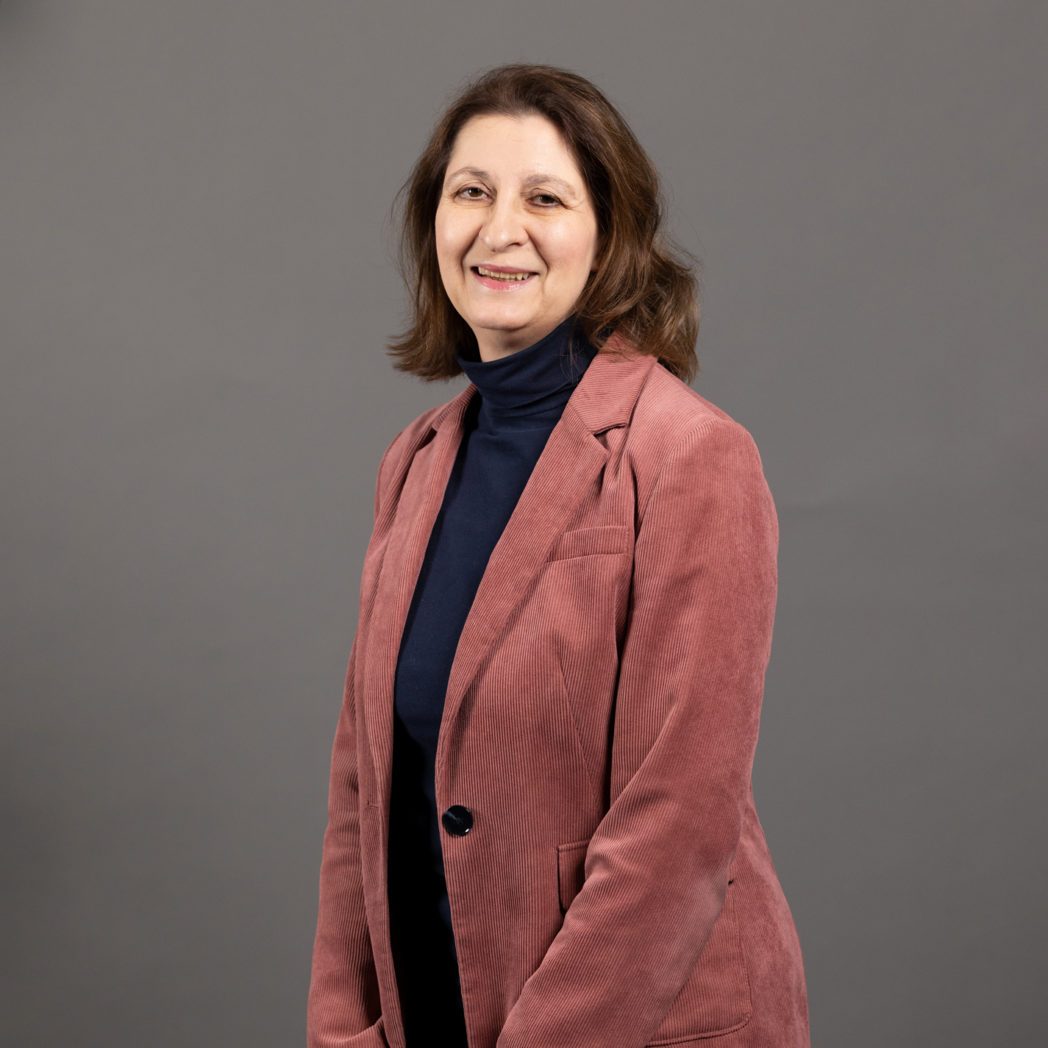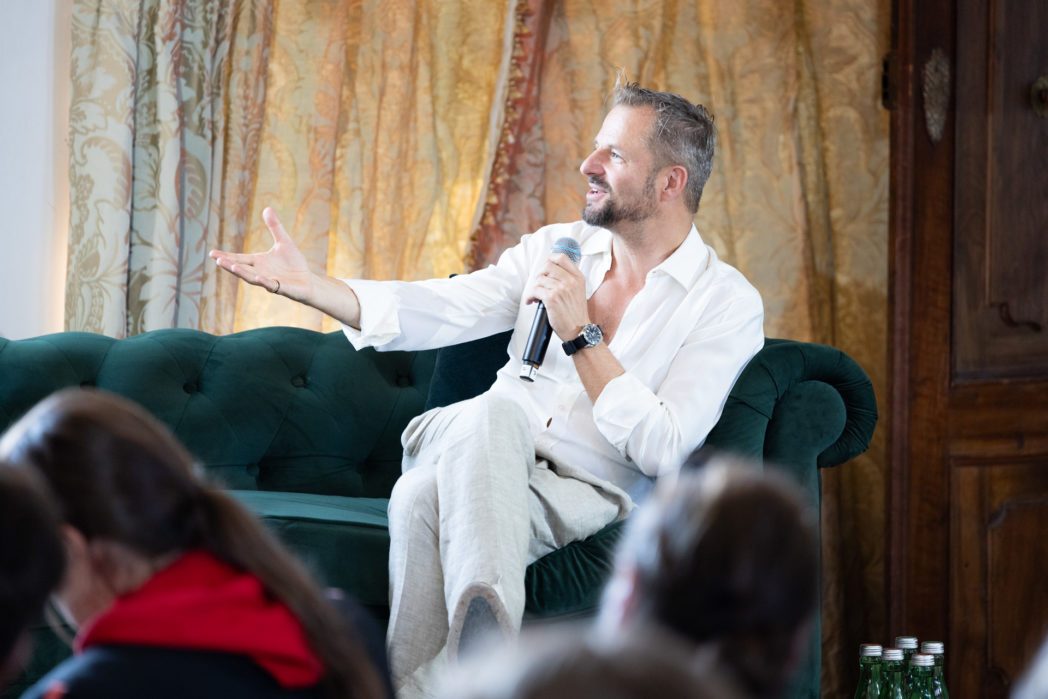
For the first time, the Media Summit featured a pre-program with an info hour and workshop, providing updates on current industry developments. Read on for the report on the pre-program.
Can AI Be Creative? On Unpredictability and the Beauty of Mistakes
What impact does technology in general and AI specifically have on artistic creation? Moderator Ralf Hillebrand (SN) posed this central question to his panel. Participants included actress and screenwriter Konstanze Breitebner, film composer Harold Faltermeyer, “Jedermann” actor and musician Philipp Hochmair, and Sky Austria CEO Michael Radelsberger.
At the start, the discussion focused on how AI and high-tech affect the participants’ respective fields. Konstanze Breitebner noted, “AI can conjure up smooth screenplays and stories on your computer in seconds, but that has nothing to do with creativity. It’s merely based on what the AI has learned so far.” However, she also saw a positive aspect: “AI challenges me to write more creatively and unconventionally.” Philipp Hochmair emphasized the importance of mistakes in theater: “The fascinating thing about theater is the mistakes, not the perfection. Although my director at Domplatz is very perfectionist, he couldn’t completely tame me,” he joked. When asked if he would perform an AI-generated script, he replied, “Definitely! It’s exciting because humans will be performing it. As soon as humans are involved, something unpredictable happens.”
Film composer Harold Faltermeyer was more critical: “AI is a collection of plagiarisms and has nothing to do with ‘intelligence.’ I sometimes get scared when watching TV and hearing fragments of my music that barely avoid plagiarism, and I can do nothing about it.”
Michael Radelsberger stressed that AI cannot replace the human element but can be helpful in specific tasks, such as creating subtitles, making media more accessible. This will become increasingly important with the upcoming European Accessibility Act. Hochmair added that dubbing with AI will soon be possible with a click, especially since some Hollywood actors have sold the rights to their voices. “Blockbusters can thus be made available in many languages very quickly. Because of this, there will be no more voice actors in a few months.” There is union resistance against this development in the US. When asked if there is resistance in Austria as well, Hochmair replied, “It’s a fight against windmills. We have to adapt to the new times.” Konstanze Breitebner sees it more dramatically: “An entire industry is at stake here, not just voice actors, but also studios, screenwriters, and many others are affected. That’s why voice actors in Europe quickly organized, and there is now a worldwide organization. In America, it’s too late, we can’t do anything anymore.”
In conclusion, everyone agreed: Creativity and understanding of human conflicts and mistakes remain beyond AI’s reach. These aspects are what make the series and films we love so captivating.
Incentive Models Ensure International Productions
The second panel of the afternoon focused on incentive funding in Austria. Beforehand, Deputy Governor Stefan Schnöll and Federal Minister Martin Kocher gave welcome speeches. Actress and Co-President of the Austrian Film Academy Verena Altenberger, together with Hannes M. Schalle, co-initiator of the Media Summit and chairman of Film & Music Salzburg, discussed the possibility of bringing the European Film Awards (“European Oscars”) to Salzburg. This request was particularly directed at the politicians and decision-makers present.
The panel, moderated by Hannes M. Schalle, included Sylvia Vana from the BMAW and chairwoman of FISAplus, Alexander Dumreicher-Ivanceanu, chairman of Film and Music Austria, and Wolfgang Struber, managing director of the RTR.
The funding programs in the film and media industry were well received and showed noticeable effects. Sylvia Vana emphasized, “One funding euro generates three euros in production expenditure. That’s remarkable.” The new funding model FISAplus has existed since 2023, and since then, 113 projects have been handled with it, leading to over 2,000 shooting days in Austria. Vana stressed that FISAplus positions Austria well internationally, and major TV stations and streaming services have taken notice of the high quality of Austrian productions.
Wolfgang Struber from RTR mentioned the Austrian Television Fund, which is celebrating its 20th anniversary this year and has invested 121 million euros in the Austrian production landscape over that time. Alexander Dumreicher-Ivanceanu spoke about the progress in the Austrian film industry, such as the increased proportion of women, the Gender Gap Bonus, and the leading role in the green transformation of the industry. Thanks to the incentive models, Austria is now also attractive for international productions.
Regarding the new funding model in Germany, Vana was relaxed and emphasized that many co-productions with Germany require good competition and a strong German funding model. Struber highlighted the diverse landscape of producers in Austria, which is currently in a phase of transition, creating a lot of potential.
The incentive models have created new jobs in the industry, and a study on this will be published soon. Alexander Dumreicher-Ivanceanu emphasized the importance of these models as a driver of employment. Additionally, there is discussion about an investment obligation levy for streaming services that produce in Austria. This levy could benefit RTR and the Austrian Film Institute, supporting both the television and cinema sectors. It is hoped that this issue will play a role in the upcoming elections.
Streaming TV Production: Human or Algorithm as Decision Maker?
The third and final panel of the day focused on streaming TV production. The central question was: Who decides what gets produced – the algorithm or the human? Moderated by Doris Priesching (Der Standard), the panel included Andrea Bogad-Radatz, ORF’s head of film and series, Jean-Young Kwak from Amalia Film and the Studio Hamburg Production Group, Frank Holderied, head of fiction at Servus TV, and Oliver Schündler, managing director of Lucky Bird.
Doris Priesching asked if the algorithm, rather than gut feeling, now decides at the major streamers. Jean-Young Kwak explained that this depends on the maturity of the respective algorithms: “In linear TV, we’ve always used ratings to find out which stories work. Today, people decide based on data.” Andrea Bogad-Radatz emphasized: “It is and remains a ‘people’s business’.” ORF has some co-productions with Netflix DACH. “With co-productions, we naturally look at the evaluation. If everyone turns off after five minutes, that’s not good. If no one watches the second season, there won’t be a third season.” Frank Holderied added that it depends on the market: “When you produce for a global market like Netflix or Amazon, you have to decide differently. At Servus TV, we know our audience and tailor our programming accordingly.”
Everyone agreed that Austria’s incentive model has increased the country’s attractiveness to streamers. “Austria has clearly positioned itself on the map. Viewing habits have changed due to streamers, and larger budgets are necessary. We rely on international productions to manage this,” said Kwak.
Are There Global Hits from Austria?
The Media Summit took place at Schloss Leopoldskron, an iconic filming location for the now 60-year-old film “The Sound of Music.” Global hits that everyone talks about include productions like the US “Bridgerton,” South Korea’s “Squid Game,” or Spain’s “Money Heist.” Are there still major global hits from Austria today?
Andrea Bogad-Radatz explained, “Timing is also important for global success. At the time, World War II and fleeing from the Nazis were big topics in Hollywood.” Jean-Young Kwak pointed out that it depends on the target audience. Oliver Schündler added, “The German TV and streaming market is one of the largest in the world. But the one production that runs worldwide is rare.” Kwak added, “The market has changed. We have so many more productions. To stand out, you need creative minds, and an algorithm can help here.” Frank Holderied from Servus TV emphasized the strength of live and local productions: “Our strength is that we can produce live and local, which streamers cannot. We make productions where the region itself is the protagonist.”
The Human Element Cannot Be Ignored
The 19th Media Summit highlighted the multifaceted impact of AI on the creative industry, discussing both opportunities and challenges. While AI can increase efficiency, true creativity remains firmly in human hands. The discussions on incentive models and international productions showed that Austria is well-positioned to benefit from global developments. Despite technological advancements, the human element remains essential for artistic success.
Next year, we will celebrate the 20th anniversary of the Media Summit. We look forward to welcoming you there!
Thank you to all partners for the excellent collaboration!
The 19th Salzburg Media Summit was a joint event by: Film & Music Salzburg, Innovation Salzburg, the Association of the Film and Music Industry | Film and Music Austria, the Federation of Austrian Industries Salzburg, the Austrian Television Fund, ABA – Invest, Work, Film, the Austrian Film Institute, and FISAplus.
More photos can be found in the gallery and download link (all photos © Salzburg Media Summit/Markus Christ).
This might also interest you
6. March 2025
salz21: Necessary Steps for the Future
On March 5, 2025, salz21 | Home of Innovation once again provided a platform for future topics, innovations, and interdisciplinary exchange. More than 1,000 visitors took the opportunity to learn about current developments and discuss perspectives for tomorrow. Three topics were particularly dominant: climate protection, artificial intelligence, and a strong Europe.
15. August 2024
Sunbeam Yachts: Where Craftsmanship Meets Digitalization
Sunbeam Yachts has been building exclusive sailing yachts at Mattsee for generations. The production is done by hand, with some processes now digitally supported.
12. August 2024
SBS: One Software for Many Self-Service Devices
As a leading provider of banking software in Salzburg, SBS is now exploring new markets. The company remains true to its core segment by offering manufacturer-neutral software for self-service devices in additional sectors.
5. August 2024
design composite: Digitalisation in Production
In the 3,000 m² production facility, design composite manufactures panels for lightweight construction, commercial vehicles, and as design elements in architecture. By revising the digital processes, production has been further improved. Such measures can be subsidized.
